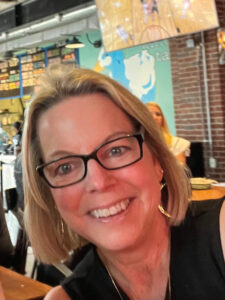Alyssa Purbeck Greer ’89
D EGREES: B.S. in psychology; M.S. and Ph.D. in clinical psychology with a neuropsychology track, Rosalind Franklin University of Medicine and Science
EGREES: B.S. in psychology; M.S. and Ph.D. in clinical psychology with a neuropsychology track, Rosalind Franklin University of Medicine and Science
JOB TITLE: Psychologist
FAVORITE TRINITY MEMORY? It’s hard to pick one memory; it was such a great college experience overall. My first Spring Weekend, it was perfect weather, and the main band was great, but I can’t remember who it was at the moment. There are certainly many other memories that shall not be print worthy.
What was your path to your current position?
I wasn’t sure if wanted to pursue medicine (neurology, psychiatry, etc.) or psychology/neuropsychology, so for four years after graduation, I worked for the Connecticut Psychological Association, where I had administrative and legislative responsibilities. I learned a lot about the practice of psychology, cementing my interest and decision to pursue a graduate degree. Randy Lee encouraged a Ph.D. in clinical psychology as it would provide the broadest career opportunities. I pursued a neuropsychology specialty, including research. The biological aspects of psychology and the brain were of significant interest to me. I then did a clinical practicum at the Psychology Clinic at Chicago Medical School with Dr. John Calamari, specializing in cognitive behavioral treatment of OCD (obsessive compulsive disorder) and loved it. Before I got my Ph.D., I worked at Rogers Memorial Hospital with Dr. Brad Riemann, an expert in OCD, in a partial hospitalization program—a day program—specializing in the intensive treatment of OCD.
What do you do in your role?
Outpatient individual psychotherapy. Cognitive behavioral therapy, specifically exposure and response prevention (ERP), for OCD and other anxiety and related disorders (social anxiety, panic disorder, hair-pulling disorder, etc.).
People often throw around the term OCD when actually describing a personality trait. What is OCD? OCD is classified under anxiety disorders in the Diagnostic and Statistical Manual of Mental Disorders. There’s definitely neurochemistry involved, the dysregulation of serotonin. It’s a pretty common disorder. We all have obsessions, intrusive thoughts or imagery in our heads. But the difference between people with and without OCD has to do with what they do with those obsessions. And what they do with those obsessions is a compulsion. It causes anxiety, and they need to do something because they think that thought is important. When they do a compulsion, they feed the anxiety cycle. The more they continue doing the compulsions, the more they’ll have those thoughts. It tends to get worse over time without treatment. It’s a vicious cycle. The treatment is basically teaching the brain that anxiety will go away without doing the compulsion. It’s ERP, purposely and gradually exposing the person to the things that make them anxious while having them refrain from doing the compulsions. When you do that, the level of anxiety will go down over time.
When should a person get treatment?
Whenever they’re happy less than 99 percent of the time. People often come to me when it’s affecting their marriage or school or they can’t do things. The good news is it doesn’t matter how far along it is; it’s highly treatable.
What do you enjoy most about your work?
The personal interactions and therapeutic relationships paired with the highly effective treatment modality in which my patients get better and reclaim their lives on a regular basis. It’s very rewarding.
How did your time at Trinity prepare you for what you do now?
Trinity gave me an all-around good liberal arts education, plus courses, professors, and opportunities to hone my interest. I did a summer psychobiology research internship with Priscilla Kehoe after my junior year, and I also did an undergraduate internship on the inpatient psychiatric unit at Hartford Hospital for a semester that showed me that I did enjoy and excel at therapeutic patient interactions.
What was the most memorable course you took at Trinity?
It’s hard to pick one, so I’m picking two: I took “Psychopathology” with George Higgins, and it was fascinating and entertaining, and I got asked to TA for the class the next semester. “Psychobiology” with Priscilla Kehoe was such a good mix of my two favorite subjects and what first led me to my possible future interests in neuropsychology and medicine.
Did you have a professor who was particularly influential?
Randy Lee was my adviser, mentor, and friend and helped guide my decision to pursue my Ph.D.
